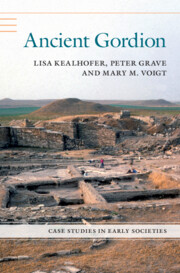Book contents
- Ancient Gordion
- Case Studies in Early Societies
- Ancient Gordion
- Copyright page
- Contents
- Acknowledgments
- Abbreviations
- 1 Introduction
- 2 Inventing Identity
- 3 Contextualizing the Ceramic Assemblage
- 4 Identifying Gordion’s Groups
- 5 The Late Bronze Age Community at Gordion
- 6 Reconstituting Community in the Early Iron Age
- 7 New Identities, New Communities
- 8 Enacting Power
- 9 Identities in Flux
- 10 Conclusion
- Appendix Eski Çağ’da Gordion:
- References
- Index
1 - Introduction
Iron Age Ceramics and Phrygian Gordion
Published online by Cambridge University Press: 23 September 2022
- Ancient Gordion
- Case Studies in Early Societies
- Ancient Gordion
- Copyright page
- Contents
- Acknowledgments
- Abbreviations
- 1 Introduction
- 2 Inventing Identity
- 3 Contextualizing the Ceramic Assemblage
- 4 Identifying Gordion’s Groups
- 5 The Late Bronze Age Community at Gordion
- 6 Reconstituting Community in the Early Iron Age
- 7 New Identities, New Communities
- 8 Enacting Power
- 9 Identities in Flux
- 10 Conclusion
- Appendix Eski Çağ’da Gordion:
- References
- Index
Summary
Archaeologists have long grappled with understanding the nature of transformations in human societies. Some of these transformations are seen as “revolutionary,” including the development of tools, the creation of imagery, the domestication of plants and animals, and the rise of urban and state-level societies. While the complexity and diversity of these reconfigurations has become more apparent with every new study, social group restructuring is crucial to each. Cultural transformations may share characteristics, but the organization and workings of social groups appear specific to each threshold of change. From this perspective, we argue that fundamental societal transformations are more intimately entangled with innovations in group formation – new modes of kin definition, religious groupings, political organizations and manipulation of ancient social media – than driven by technological innovation.
- Type
- Chapter
- Information
- Ancient Gordion , pp. 1 - 11Publisher: Cambridge University PressPrint publication year: 2022

